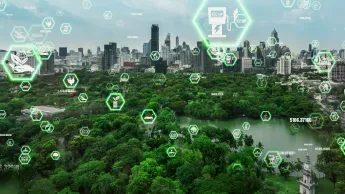Three Questions on SDG 11 – Sustainable Cities and Communities
- 2020-09-29
- Comment

We spoke with Jack McQuibban, Cities Programme Coordinator at Zero Waste Europe about the Zero Waste Cities approach and his work for the organization. Jack’s role is to build knowledge and provide tools to help local communities and cities play a leading role in turning the circular economy into reality for Europe. During his spare time, Jack is a keen runner and cyclist, using any opportunity to get out into nature and any excuse to enjoy a good coffee and cake on the way.
1014: Sustainable cities and communities require efficient waste management systems to ensure good living standards and to reduce the adverse environmental impact of cities. How do you assess the situation in European communities at Zero Waste Europe?
Jack McQuibban: In many countries and communities in Europe, there is a heightened awareness about the importance of waste reduction in light of limited resources and pollution. Some countries fare better with their recycling efforts than others. Yet, some of those doing better still have large amounts of residual waste because of their high income and consumption levels. Other countries use sophisticated high-tech methods to burn waste in an effort to avoid landfills. However, this method has its own ecological problems since it uses energy, does not address the right use of resources and therefore lacks the desired sustainable effects.
Therefore, despite the heightened awareness, a lot remains to be done in Europe on the path towards phasing out waste by creating and implementing systems that do not produce waste in the first place. No community produces absolutely zero residual waste yet; our ambitious goal of “zero waste” describes the end of a long but rewarding process towards making waste management more effective, of improving the system of recycling and preventing waste from occurring in the first place. As of now, nearly 400 European cities have taken on the challenge of becoming zero waste.
1014: With your nongovernmental organization you empower communities to rethink their relationship with resources. Can you describe what levels you engage on and what kind of support you provide?
Jack McQuibban: Zero Waste Europe is based in Brussels and works together with a network of local nongovernmental organizations, a total of 31 organizations in 24 European countries including non-EU members like Albania and Montenegro. We provide them with tools, knowledge and expertise, and help them find the right approach to work towards transitioning the systems in their communities from focusing on residual waste management to circular resource management. There is no one-size-fits-all approach as circumstances vary from community to community, region to region and country to country.
The local organizations, autonomous in their activities, engage their communities with suggestions of effective waste management. They address the authorities in their municipalities, policy makers, community leaders, waste professionals, city planners. They talk to the business community, lobby households to adhere to recycling standards, and engage students in schools and educational institutions. Their activities range from advocacy, education and training, to community building and mainstreaming smart and healthy lifestyles. They organize waste prevention activities, develop reuse strategies and lay out zero waste business models.
In an ideal world, we would overcome our traditional ways of co-existence and experience a true cultural change towards sustainable cities and communities, switching our view from efficient waste to resource management at its forefront. City authorities would provide the necessary legal framework, business leaders would embrace the concept of sustainable production, and citizens and households would take pride in reusing, repairing and recycling items. The circular economy would become reality, creating enjoyable and thriving communities with high living standards for their citizens. The adverse environmental impact of cities would be diminished, preserving the planet, our habitat for future generations. People would live in sync with resources and nature while enjoying well-being and a new, sustainable prosperity.
